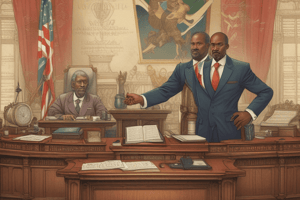Podcast
Questions and Answers
Give an example of a culturally-motivated crime in South Africa involving indigenous beliefs and customs.
Give an example of a culturally-motivated crime in South Africa involving indigenous beliefs and customs.
Witchcraft and muti-murders
What legal traditions does South African customary law share an equal footing with?
What legal traditions does South African customary law share an equal footing with?
Other legal traditions
How is the South African legal system characterized in terms of its legal systems?
How is the South African legal system characterized in terms of its legal systems?
Blend of multiple legal systems
What role does each legal branch play in shaping society in South Africa?
What role does each legal branch play in shaping society in South Africa?
How does the legal framework in South Africa need to evolve as society changes?
How does the legal framework in South Africa need to evolve as society changes?
What fundamental human right protections in the South African Constitution can be potentially violated by culturally-motivated crimes?
What fundamental human right protections in the South African Constitution can be potentially violated by culturally-motivated crimes?
What is the primary purpose of the Constitution of the Republic of South Africa?
What is the primary purpose of the Constitution of the Republic of South Africa?
What are the two main sources of criminal law in South Africa?
What are the two main sources of criminal law in South Africa?
How can indigenous beliefs and customs lead to the commission of crimes in South Africa?
How can indigenous beliefs and customs lead to the commission of crimes in South Africa?
What provisions does the Constitution of South Africa make for amending itself?
What provisions does the Constitution of South Africa make for amending itself?
How does the Constitution of South Africa address issues of equality and non-discrimination?
How does the Constitution of South Africa address issues of equality and non-discrimination?
What is the role of South African customary law within the broader legal system?
What is the role of South African customary law within the broader legal system?
Flashcards are hidden until you start studying
Study Notes
Law in South Africa: A Comprehensive Overview
Law in South Africa encompasses several key areas, including constitutional law, criminal law, and South African customary law. Each of these branches plays a significant role in the functioning of the South African legal system.
Constitutional Law
South Africa operates within a constitutional framework established by the Constitution of the Republic of South Africa, 1996. This document sets forth fundamental principles and guarantees certain basic rights for all inhabitants of the country. Among these protections are provisions related to equality, dignity, and non-discrimination.
The Constitution defines and regulates the structure of government, allocating powers and responsibilities among different levels and branches. It provides mechanisms for amending the document itself, ensuring that any changes align with the principles outlined in the preamble.
Criminal Law
In South Africa, criminal law is governed by both common law and statutory provisions. Common law crimes consist of offenses recognized at common law, without explicit legislation. Statutory crimes involve specific acts prohibited by statute. Both types of offenses are subject to adjudication within the South African judiciary.
There are instances where indigenous beliefs and customs can lead to the commission of common law and statutory crimes. Examples include the belief in witchcraft and witch killings, the belief in the tokoloshe, and the use of muti-medicine. These practices can result in cultural motivations for criminal behavior, posing challenges to the enforcement of local statutes.
Customary Law
South African customary law, often referred to as African customary law, occupies a unique position in the legal landscape. While customary law shares an equal footing with other legal traditions, there are instances of conflicting interpretations between common law and customary law principles. Some examples of culturally-motivated crimes arising from indigenous beliefs and customs include those involving "culturally motivated" crimes like witchcraft and muti-murders. Additionally, these beliefs can potentially violate fundamental human right protections enshrined in the Constitution.
Conclusion
The South African legal system is characterized by its blend of multiple legal systems, including constitutional law, criminal law, and customary law. Each branch plays a crucial role in shaping society's governance and upholding individual rights. As the society evolves, so too must the legal framework, working to resolve conflicts and reconcile differing viewpoints to ensure fairness and justice for all.
Studying That Suits You
Use AI to generate personalized quizzes and flashcards to suit your learning preferences.




